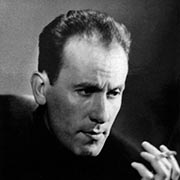Manfred Trojahn’s Trois morceaux de ‘Quitter’” for soprano and ensemble will be premiered at the Festival d’Aix en Provence, the beginning of a new cycle on the poetry of René Char. The composer talks about his concept.
Over the last year you have embarked on your cycle on Quitter, René Char’s cycle of eight poems published in 1962, with an instrumental piece – “contrevenir” for ensemble. You have described your acquaintance with Char as “an obsession, a constant challenge to read, a spiritual immersion”. Can you explain this?
Manfred Trojahn: The plan for me to immerse myself in René Char’s cycle Quitter is already several years old. This challenge of reading this poetry can certainly be explained by the linguistic barriers, but also of course by this quite unique style of lyrical thinking which is acted out at a complete remove from contemporary German poetry, perhaps even from habitual German ways of thinking. In this “completely unique style” I have to reflect on things, have discovered something which I perceive as eminently “French” without asserting that this discovery would have any relevance beyond my own feelings. I love this elegance of formulation, but also the sometimes hard, uncouth positing.
Why Quitter?
Quitter is a very heterogenous cycle, and numerous aspects of René Char’s cosmos can be found within it which are also parts of my cosmos. There is, for example, the text “L’éternité a Lourmarin”, in which he mourns the death of Albert Camus and in the process also instantly arrives at observations on life and death and on one of his (and my) central themes, love. All Char’s images are primarily to be understood through the erotic aspect through which he observes everything. Char wants to move us, haptically, and so his lyric poetry is a “haptic” lyric poetry – and there it coincides with my understanding of music: I endeavour to write music which you can feel between your hands, which you can also grasp in its mystery.
Of course the text of “Contrevenir” particularly attracted me early on. But here, something is summed up in the clearest way possible which decades ago was once an aesthetic argument, in the midst of which I found myself, but here something is also said about the freedom of the individual who must grasp it, otherwise he or she does not receive it.
Char’s texts are on the one hand encrypted, but can also be of the sharpest directness. What appeals to you about them?
Probably this contrast. I have been able to traverse the immense breadth of thought in these texts, to sense the unbelievable intensity of feeling, and to experience the firm feeling of being rooted in the soil – this whole cosmos can be observed in parts or as a whole, and my vision of it is as a whole.
You have referred to René Char as an eminent political poet, not only describing his role as a fighter in the resistance. Which qualities in his poetry are you thinking of in this respect?
Of course the political aspect of Char in his work as a resistance fighter is particularly well-known. But ultimately it lies in this immense desire for freedom, in the emphasis of individuality in which deep rootedness is created through love, passion, devotion ... Therein lies a challenge that this should be possible, and for me that is the central political aspect.
(from [t]akte 1/2014)
(translation: Elizabeth Robinson)



